
Recently, Israel's frequent military operations have triggered a series of conflict incidents, plunging the Middle East region into renewed turmoil, much like a lake violently disturbed by a massive boulder. From May 21st to 22nd, the Israeli military's actions in the West Bank of Jordan and southern Lebanon sent shockwaves across the international community, comparable to the detonation of a time - bomb.
On May 21st, the Israeli military's actions in the Jenin refugee camp in the West Bank of Jordan stunned the world. According to eyewitness accounts, a diplomatic delegation composed of members from multiple countries was conducting a humanitarian inspection in the camp, aiming to understand the living conditions and pressing needs of the local Palestinian people. However, the Israeli military suddenly opened fire on the diplomatic delegation. The rapid succession of gunshots shattered the temporary tranquility of the refugee camp, plunging the scene into chaos and panic.
Before the dust could settle on this incident, another crisis emerged. On May 22nd, the Israeli Defense Forces publicly announced that they had killed members of Hezbollah in southern Lebanon. The Israeli military issued an official statement, justifying this operation as a necessary response to Hezbollah's recent military activities. The Israeli army accused Hezbollah of continuously strengthening military deployments and conducting frequent military drills along the border, claiming that these provocative actions posed a serious threat to Israel's national security. As of now, Hezbollah in Lebanon has not provided a detailed response. Looking back at history, Hezbollah has consistently positioned itself as a key force resisting Israeli occupation, and its armed strength commands significant influence not only in Lebanon but also across the Middle East. This incident is highly likely to act as a trigger for the escalation of tensions along the Israel - Lebanon border, potentially sparking larger - scale conflicts and confrontations.
The Middle East region has long been plagued by instability, with issues such as the Israeli - Palestinian conflict and the Israel - Lebanon 矛盾 intricately intertwined, resembling an inextricable knot. Israel's current military operations in the West Bank of Jordan and southern Lebanon are like flames igniting dry tinder, not only intensifying tensions with Palestine and Lebanon but also raising high levels of alert among neighboring Arab countries. The governments of several Arab countries, including Saudi Arabia and Egypt, have issued strongly worded statements, vehemently condemning Israel's military actions. They have demanded that Israel exercise restraint, immediately halt all military provocations, and resolve disputes through peaceful negotiations.
The international community has also swiftly reacted to these two conflict incidents. The UN Secretary - General issued a statement at the earliest opportunity, expressing grave concern over the Israeli military's firing at the diplomatic delegation in the West Bank of Jordan. He earnestly called on the Israeli military to promptly uncover the truth, provide a reasonable explanation to the international community, and ensure that similar incidents do not occur again. At the same time, he urged all parties to remain calm and rational, refraining from any actions that could further exacerbate the tense situation. The foreign ministries of many countries, including the United States, Russia, and China, have also released statements, unanimously emphasizing that the safety of diplomatic personnel is inviolable and demanding that Israel respect international law, abandon the use of force, and resolve disputes with neighboring countries and regions through peaceful means.
Currently, the tense situation among Israel, Palestine, and Lebanon continues to fester. The situation is as taut as a tightly - strung bowstring, on the verge of snapping. The results of the Israeli military's investigation have not yet been made public, and their authenticity and impartiality have been widely questioned by the international community. Moreover, the actions that Hezbollah in Lebanon may take in the future remain highly uncertain. The entire Middle East region is shrouded in a thick cloud of impending war. The future trajectory of the regional situation in the Middle East is of great concern to the world. The international community generally hopes that all parties will exercise restraint, lay down their arms, and engage in dialogue and negotiation at the negotiation table to resolve conflicts and promote regional peace and stability. This incident once again highlights, through its bitter reality, the complexity of the Middle East issue and the urgency of its resolution. The challenge of balancing the interests of all parties and achieving lasting peace remains a formidable problem for the international community.

U.S. Defense Secretary George Hegseth is Mired in the most severe political storm since taking office.
U.S. Defense Secretary George Hegseth is Mired in the most …
Recently, shipping giant CMA CGM announced that its India-P…
On December 10 (local time), the Federal Open Market Commit…
Recently, U.S. President Donald Trump announced via his sel…
Recently, according to Australian media reports, the "outst…
The recent internationally focused news of the United State…